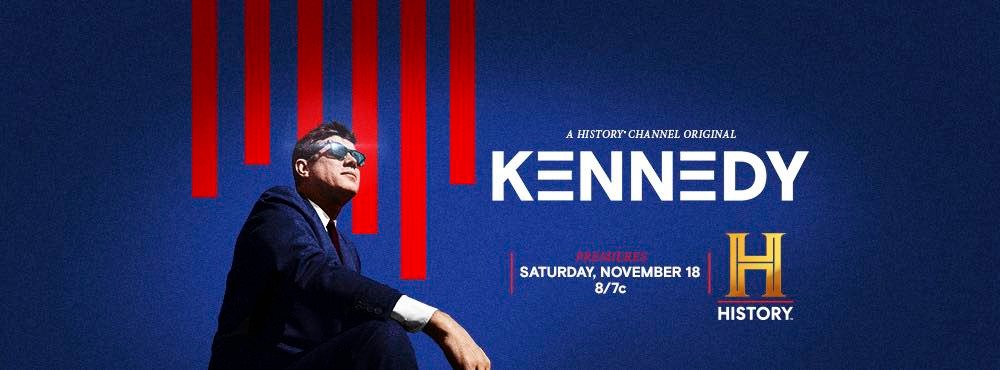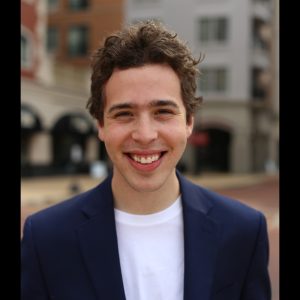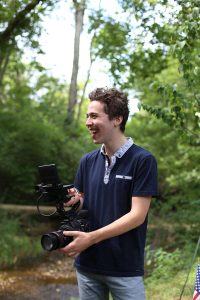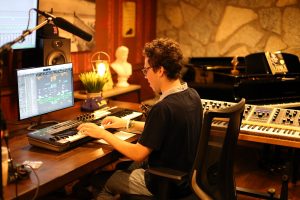
Sixty years following JFK’s assassination, “Kennedy”, the new eight-part docuseries, is the creation of director and composer Ashton Gleckman, a Carmel native. His partners in the production are Gleckman’s production company, Blackbird Pictures, and Academy Award®-winning production company, RadicalMedia. Producers are Jon Kamen, Dave Sirulnick and Robert Meitus. Narrated by Emmy Award®-winner Peter Coyote, the three-night event surveys the life, legacy and leadership of John F. Kennedy, the 35th President of the United States.
The story is told through archival footage and over seventy new interviews from those most familiar with JFK’s history including comedian Conan O’Brian, JFK’s niece Kathleen Kennedy Townsend, actor Bruce Greenwood and Pulitzer Prize-winning journalist Eileen McNamara. The Original score is composed by Gleckman, Michael Frankenberger and Cameron Moody. “Kennedy” airs November 18-20 at 8 p.m. and 7 p.m. CST on the HISTORY Channel.
Recently I spoke with 23-year-old Gleckman on a Zoom call to discuss his newest creation and its production. Below is an edited transcript, including email communication, of our conversation about his rarified experience.

Ashton Gleckman – Courtesy of Blackbird Pictures. Used with permission.
How does it feel knowing your “Kennedy” series is about to premiere?
You know, it is from an artistic perspective. I think whenever you are getting ready to release something that you have spent so long putting so much effort into, it is nerve wracking. For me, this project is a culmination in many ways of everything that I have done up to this point. It is the number of interviews, the scale of the story, but also just the amount of effort I put into it. I have been working on it for every day for three years. And so just today we delivered the final episode of the show. And it almost feels surreal to be finished after three years. So, I would say from an anticipation perspective, it is very exciting. But in a sense, I am giving it to the audience now. It is time for the series to now belong to the audience rather than me. And that is a transition that must happen for every piece of art.
Do you feel you completed it to your total satisfaction?
Ridley Scott, a great legendary filmmaker, was asked when he looked at his old movies if he was embarrassed or wanted to make a change. And he said something like “no, because every single film that I have made was basically where I was at that point in my life and where my skills were and where everything else was.” When I look back at this, I will say I tried my absolute best. And I did the best work I could have at this moment in time and in history. For me, I have put my heart into it. I have put my effort into it. And at the same time, I think, from a perfectionist perspective, you are always going to obsess over details. But at a certain point, part of being creative is turning it off and saying OK, I am ready to share it now. I am ready to put it out. It does not matter if it is a song or if it is a TV show or a movie or a musical. You must put it out and take that leap.
What is your fascination with JFK?
JFK was a towering figure in American history that helped define an entire generation. So many of the things he spoke about and was a part of, from international relations, civil rights, healthcare, space exploration, is all relevant to where we are now. He is timeless, you could say.
Is history a passion of yours, too?
I love history because history defines who we are, where we came from, where we are in our times today and where we are going. History is the ultimate guide for civilization, a sort of way to reflect on us and connect with what has come before us. I also love history because it is a way of empathizing with people that are no longer here, seeing them as the three-dimensional people that they were. History teaches us so many lessons and it is simply fascinating.
What attracts you to the documentary format?
I love the doc format because it is a way of making accessible real stories that relate to us and our world. It is a form of investigative journalism and I love getting to spend time with real people, visiting real locations and sites, spending time in the archives, having it be such an editing-intensive process and combining so many different art forms. It is a real adventure.
Describe your brand?
Part of my brand is the connection between music and score and filmmaking. I plan to keep working in parallel in both fields and really love both. Music and film scoring is where I began and that is at the very core of me. In terms of my film brand, I would say it’s making films about stories I really care about and stories that are relevant for the world we live in today.
How did it feel to get up close and personal to JFK’s family, friends and colleagues?
My favorite part of the process are interviews because they take you on the road. In my case, we rented a car, drove it around the country, spent about three weeks on a driving tour and went to Boston and Washington, DC, New York City, Philadelphia — all over the East Coast. And then I did all the flight interviews. And to be able to go from one interview with Kathleen Kennedy Townsend, Robert Kennedy’s daughter and JFK’s niece, and then go to an interview with a historian like David M Kennedy, or an interview with Conan O’Brien, was a thrill. It is also a privilege, because I realized I was sitting next to people that are truly extraordinary, have accomplished a lot and have done such amazing work. I always felt very humbled when I sat next to these people and certainly in the case of the Kennedy family members I spoke to, I felt it was almost surreal, because I am talking to those who are blood related to JFK. It was a privilege.

Ashton Gleckman – Courtesy of Blackbird Pictures. Used with permission.
How did you, how did you manage to secure your subjects, especially getting past gatekeepers?
Honestly, the way that I did it was just by picking up a phone and writing e-mails When the project started out, it was not a big History Channel production. It was a small, intimate, grassroots project with a few other producers and my crew of two other people. So, by no means was it a large budget production where a PR agent reached out to these people. Sometimes I cold called if I could not find an e-mail address and said, “I am a filmmaker and am working on a project about John F Kennedy. I would love to speak with you.” I just tried to really dig in and find any way to reach the people I wanted to talk to.
Were some charmed by your youth and enthusiasm?
I do not know. There were a couple times where people were a little bit surprised, I was the one doing the doc. I was twenty-one at the time I did the interviews. I could tell sometimes when I went to the interview, they thought I was working on a student film. And so, it was interesting how some reacted. I am not saying that age was a hurdle I had to cross. I just forgot about it, and I did not really use it as an excuse. I did not use it as a crutch. I did not use it as a tool. I just went out and made the film I wanted to make.
Do you consider yourself fearless?
I would say that I am but more so, I am ambitious, which is why I did not get scared about doing eight parts in a documentary project. I knew that I had done two films up to that point and in both of those films I shot, edited, did the music and the interviews. I also did the research and the publicity and all of that. I knew that I could do it. The process was not a mystery, but I think the scope of this project— had I known going into it how big it was going to be —I do not know if I would have been as quick to jump into it. But that is one of the joys of making docs. These big projects require that you just dive into the deep end. There is no way to prepare for some of these things. I went out there and I just started filming interviews and talking to people. In a way, I was researching like a reporter. It was very investigative, but rather than investigating the Kennedy assassination, I was investigating the life of Kennedy.
You also raised the funds to produce Kennedy, did you not?
That is right. Yes. So again, during that first part of the project, when there was not some kind of big studio that was attached to it, it was up to me to get the project off the ground. Which meant I had to be the one going out and talking to potential investors. I had to raise the money. I had to get the crew together and then I had to get all the interviews planned. The entire eighty plus interviews I scheduled myself. I also made all the arrangements for the hotels and travel. Yes, it was quite intensive, but also just a fun project.
Do you feel like you made lifelong friends out of the process?
Yes. Every project you do, you meet new people that become part of your group and you make these people friends. And yes, there’s certainly people you know on this project, whether it is the people from the History Channel or RadicalMedia, with whom I have worked. They are going to be hopefully longtime friends as well as the crew, who were phenomenal.
How did you want your doc to be different from all the others that came before?
In thinking about figures like JFK and documentary work in general, there is always a desire to find a something, a something that’s new to tell about your subject. The most important thing is to make it as engaging as possible. For me, that was trying to dig in and find archive materials that were interesting to me personally. I tried to find all the color footage and photos I could. There are over two thousand different archival assets in the entire show. Part of my goal was to let us just make an entertaining, engaging documentary that allow people not only in this generation, but also past generations who grew up with this story, to see it in a new way—through the color film and through the rich archives that have been building up over the decades.

Ashton Gleckman – Courtesy of Blackbird Pictures. Used with permission.
Tell me about the archival footage you used in “Kennedy.”
It is an archive driven documentary. For the first half of the series, which is before he even becomes president, this is a period of his life that is not as documented as his presidency. So, I had to go, we had to go, including my archival producers at Radical Media, and find pictures and archives that were hidden. It was hard to come across some of them, but to get audiences into the story and engage with it throughout these eight episodes, it was important to include them. For me, it was also my perspective. I wanted to tell it from a youthful perspective. From a sense of generation. One of Kennedy’s famous quotes is from his inaugural address when he refers to “passing the torch from one generation to another.” I want this doc to pass the experience of his generation to mine. In many ways, this is a project that is my personal exploration into history. It includes a lot of the things in which I am personally interested. I love the history of World War II, the Civil Rights Movement and the Cold War. By doing this documentary and by showing JFK’s story, I was also able to bring some of the passions that I have in all these different topics.
Speaking of passions — tell me about the score you composed?
The score itself is not what we call period. It is not necessarily using all the instruments and the techniques or whatever that the music would have included at that time. The score is much more a contemporary score. There are synthesizers, there’s orchestra, there are a lot of pianos, there is celesta and all other sorts of things. It is a very intimate but contemporary score.
Who are your musical influences?
The big ones are Steven Spielberg, John Williams, Stanley Kubrick, Christopher Nolan, Werner Herzog and Ridley Scott.
Did you include music from various periods of JFK’s life covered?
Some. There’s only a couple of sync tracks that we used in the first episode that are from the 1920s and 30s and when he was growing up. There is also one my favorite sync tracks or needle drops that we have in the show in episode one when we use Beethoven’s “Pathetique” sonata, which is one of my favorites. I used that to describe the Kennedy family at an early stage in his life. I wanted to keep the series constantly moving because I had to cut the show down from its 14-hour original runtime to eight episodes. Part of that meant that there was not as much time for some of the other stuff that I might have wanted to try, but I needed to keep the show punchy and tight. But I do love the music of the period.
Is there an official premiere?
So yes, so we are going to have a premiere of the series in New York. And then for the actual airing nights, I am gathering with my family and friends to watch it on TV. After three years of work, I will just be sitting on my couch at my home here in Carmel and watching the show like everyone else. We are also doing an Indy premiere with Heartland Film Festival. The event takes place on Nov. 15 at 7:00 p.m. at the Toby Theatre at Newfields, where there is a screening of one of the episodes.
What do you want viewers to take away from this series?
People expect an existential kind of answer having to do with the state of the world and the state of politics. But for me it is one word —hope. This was a moment in history during which there were a lot of difficulties and challenges, and the Cold War was going on. But there were also social movements occurring which were cause for hope. There was a future with hope about going to the Moon. Then there was the Peace Corps. There were possibilities. I think that at a time when we are struggling and are more divisive than ever, we need hope. I want people to turn off the news, turn on “Kennedy” and spend some time with this remarkable historical figure, John F Kennedy. Now, even after three years of working on this show, I am still fascinated with his life. I hope that viewers will get a new perspective on JFK and that it will inspire them. That is my goal.
|
|





